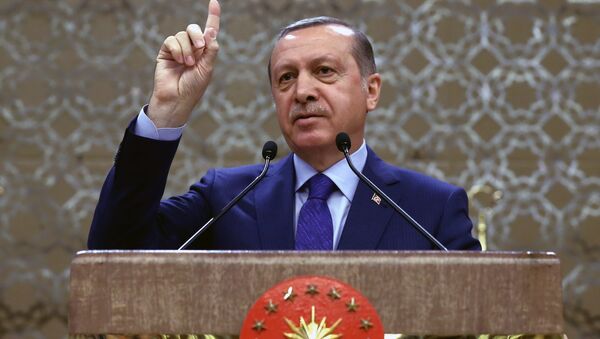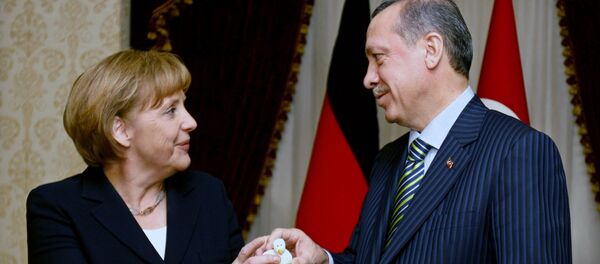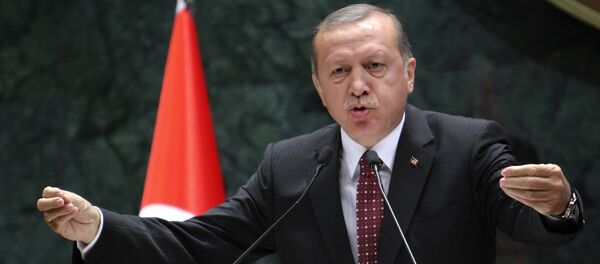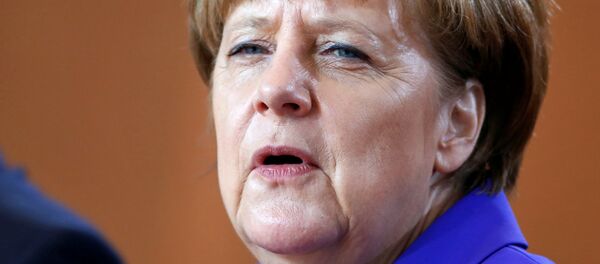Preceding the United Nations World Humanitarian Summit, which took place in Istanbul, Turkey, on May 23-24, European Parliament President Martin Schulz warned that under Recep Tayyip Erdogan Turkey is becoming a "one man state."
In an interview with Germany's Kölner Stadt-Anzeiger media outlet, Schulz stressed that there will be no visa-free travel for Turkish citizens in Europe until the country's leadership satisfies all the EU's conditions.
"We see that Turkey under Erdogan is on the way to a one man state… We have to make it clear that we do not idly accept the monopolization of power in one man's hands," Schulz told the media outlet as quoted by Politico.eu.
Nothing even hinted at any trouble after Turkish President Erdogan and German Chancellor Angela Merkel held a meeting Monday and agreed to continue dialogue regarding the EU-Turkey visa liberalization.
However, that did not prevent Erdogan from de facto blackmailing the German leadership on Tuesday by threatening to drop the refugee agreement with the EU if it does not lift its visa requirements.
"Turkish President Recep Tayyip Erdogan's latest salvo at the European Union came when Angela Merkel least expected it," Arne Delfs of Bloomberg writes, "The German chancellor was winding up the first day of a two-day cabinet retreat at a Baroque schloss near Berlin when Erdogan threatened to tear up the central plank of Turkey's refugee accord with the EU."
"Coming just 24 hours after he and Merkel met during a UN conference in Istanbul, the volley caught the government off guard with the chancellor pushing back only on Wednesday after the conclave ended," the journalist remarks.
Whether one likes it or not, it is Erdogan who is currently controlling the flow of migrants entering the EU. The Turkish president believes that he has the upper hand in the situation and has no scruples about twisting the EU's arm into making concessions.
He even went so far as to lambast Brussels for not keeping its promises on financial aid to Turkey.
"When we look at what has been done so far, unfortunately, we see that this [financial] support is not progressing as promised," Erdogan emphasized as cited by Associated Press.
In its turn, Ankara should meet the EU conditions, most notably to change Turkey's "anti-terrorist" legislation which is currently used by the Turkish leadership to silence the growing dissent in the country. As of yet, Erdogan has refused to change the controversial law.
Furthermore, last week the Turkish parliament voted to lift the immunity of 130 lawmakers from different parties — a move that could result in arrests of Erdogan's political rivals in parliament.
"Erdogan uses Turkey's ability to stop or considerably decrease the flow of refugees triggered by the war in Syria as leverage in relations with the EU. He also uses the international fight against the Islamic State of Iraq and the Levant (ISIL) — Daesh with Arabic initials — as leverage in relations with the US," Turkish journalist Murat Yetkin writes in his article for Turkish Hurriyet Daily News.
At the same time nothing will stop Erdogan from consolidating power in his own hands and transforming the country into a presidential system, he notes.
"That is actually Erdogan's game plan: To let all concerned, inside and outside the country, know that there is only one address of power left in Turkey come to agreements with," Yetkin stresses.
Meanwhile, it seems that new clouds are gathering on the horizon of EU-Turkish relations: according to Deutsche Welle, in June Germany's Bundestag — the lower house of parliament — intends to approve a resolution denouncing the 1915 Ottoman massacre of Armenians and recognizing it as "genocide."
The move will undoubtedly irritate Ankara and add more fuel to the fire of the tensions between Turkey and the European leadership.




